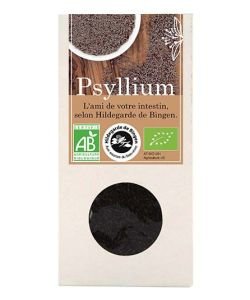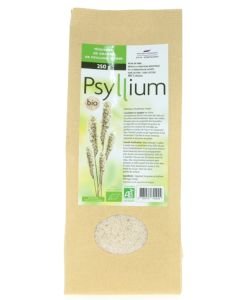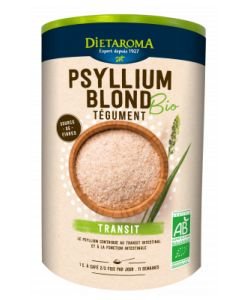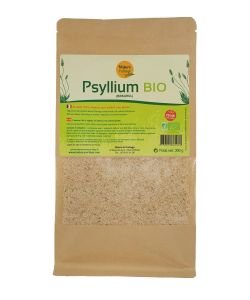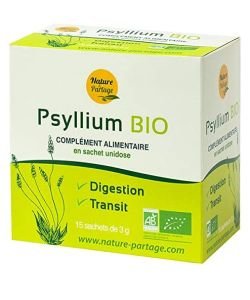Friend of your intestines, psyllium is a seed which increases by 5 to 6 times its volume in contact with water and forms mucilages.
Psyllium: the friendly seed of your intestines according to Hildegarde de Bingen
Psyllium is a seed not assimilated by the body.
By gorging itself with water it increases by 5 to 6 times its volume and forms mucilages with a purely mechanical effect.
Your gut will thank you.
Virtues
Brown psyllium:
- increases the volume of stools and promotes the transit of the food bolus. It is not irritating to the intestine, contrary to other plants with the same indication (eg: senna, buckthorn).
- can be used as an appetite suppressant.
- can be added to your preparations directly on the plate: muesli, soup, various dishes ... to promote digestion.
- can be used in cooking as is or reduced to powder, as a thickener and for gluten-free preparations (bread, cake, pastries).
Indication
Do you know Hildegarde de Bingen?
Benedictine, Abbess and emblematic woman of her time (1098-1179), Hildegarde de Bingen marked all of Europe through her influence in the political, feminist, musical, philosophical and medical fields.
Her teaching is the Western equivalent of Indian Ayurveda or traditional Chinese medicine. Famous in Northern Europe, Hildegarde is increasingly known in France.
Diet and power of plants :
Blends of organic plants, fruits, flowers and spices, Hildegarde products are easy to use, tasty and beneficial for health.
They combine the pleasure of doing good and reconnecting with a thousand-year-old knowledge of our European tradition.
Benedictine, Abbess and emblematic woman of her time (1098-1179), Hildegarde de Bingen marked all of Europe through her influence in the political, feminist, musical, philosophical and medical fields.
Her teaching is the Western equivalent of Indian Ayurveda or traditional Chinese medicine. Famous in Northern Europe, Hildegarde is increasingly known in France.
Diet and power of plants :
Blends of organic plants, fruits, flowers and spices, Hildegarde products are easy to use, tasty and beneficial for health.
They combine the pleasure of doing good and reconnecting with a thousand-year-old knowledge of our European tradition.
Use
Swallow a tablespoon of psyllium. Drink immediately at least 1/4 liter of water.
Or mix directly into your soups, dairy products and compotes.
It is also an interesting thickener in your recipes.
Or mix directly into your soups, dairy products and compotes.
It is also an interesting thickener in your recipes.
Composition
Psyllium * (plantago afra, of European origin, the variety recommended by Hildegarde).
Analysis per 100g:
* product from organic farming.
Analysis per 100g:
- Energy: 917 kJ / 224 kcal
- Fat: 3.2g
- Carbohydrates: 0g
- Proteins: 17g
- Salt: 0.03g
Special precautions
Store in a cool, dry place.
Conditioning
Box of 100g.
Hildegarde of Bingen.
Hildegarde of Bingen.
Associated products
Comment (8) -
Comments from others countries
Catherine M.
> 65 years

24/06/2021
J'en suis très satisfaite surtout qu'en plus, le prix est compétitif par rapport à d'autres sites. J'espère tout simplement que çà continuera.
Roger B.
> 65 years

09/06/2021
Excellent pour le transit
Claudine G.
> 65 years

07/04/2017
difficile à avaler aussi bien dans l'eau que sans eau.
Carole H.
45-55 years

03/06/2016
proposition d'un plus gros paquet serait appréciée
Josiane C.
> 65 years

25/03/2016
Ne convient pas très bien à mon intestin.
Marianne N.
35-45 years

11/04/2015
Acheté pour prévenir la constipation de notre chat
Raymonde C.
> 65 years

04/04/2015
en fait je crois que c'est de ma faute ; je croyais acheter du psyllium blond et non du psyllium noir en grains qui ne peut être utilisé en l'état - j'avais déjà acheté du psyllium blond chez vous alors j'ai pensé que j'aurais le même
Katia P.
45-55 years

28/01/2015
pas très agréable à avaler, n'a pas essayer suffisamment pour juger l'efficacité.
Log in to add a comment.New client ?
Start here .
Customers who bought this product also purchased

Copyright© 2004-2024 Idily n°Siret 51151936500015 - VAT number FR65511519365 - VAT number BE0425925218

